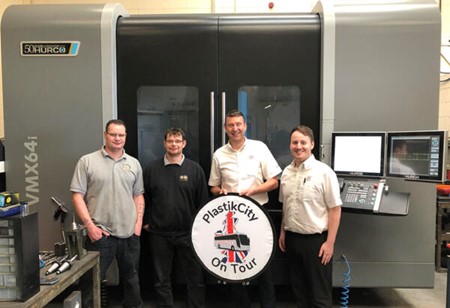With global supply chains breaking down due to the COVID pandemic, coupled with the ‘Brexit effect’, many companies have considered bringing their outsourced tooling manufacture closer to home.
With large OEMs such as JLR waving the flag for building a UK-based supply chain, we are probably right to be more optimistic about the future of our toolmaking industry. But do you need deep pockets to be patriotic and support the cause?
The obvious stuff! On the face of it, tooling produced in the Far East is going to be cheaper. That said, some of PlastikCity’s Partner companies firmly believe that once you factor in costs such as travel expenses, increasing shipping costs and having to deal with the usual post-delivery ‘tweaks’, actual cost differentials are typically only around 10%.
Longer-term costs. These are not always apparent from day one, but if a tool is correctly designed and specified, longer-term productivity and reduced maintenance costs come into play. To drive this design excellence, you need to fully understand the end product and a client’s long-term expectations.
Duncan Faulkner, Managing Director of Yorkshire-based Faulkner Moulds, commented:
“We always consider tooling design with a view to efficient manufacturing.
“This helps to ensure reliable, smooth-running production in the long term. The care we take at the design and product development stage ultimately helps to reduce downtime, eliminates unnecessary design improvements, and increases the lifespan of the tool.”
Investment can drive down costs. UK toolmakers know the importance of keeping labour content to a minimum. Good quality mould plates cost a similar amount regardless of your geographical location, but a time served UK toolmaker will demand a much higher hourly cost than a counterpart in the Far East. It is also true that UK and European toolmakers can more readily afford first-class software and CNC equipment. Unattended and lights-out production increases manufacturing capacity, reduces lead times and helps to control overheads.
A prime example of a company investing for the future was seen during a recent ‘PlastikCity on Tour’ visit to Leicestershire based MJ Toolmakers.
Company Director Paul McDermott talked about their move to larger premises and the recent investments made. He said:
“We’re committed to investing in the latest equipment, proven by the recent additions of three new Hurco CNC Machines and a new Charmilles 4-axis Spark Eroder.
“We’ve also added five new CAM stations, running the latest NCG CAM software, as well as five new CAD workstations, allowing us to work with all formats of drawing files.”
Time is money! Depending on complexity and size, typical tooling lead times for UK suppliers are between 10 and 12 weeks. Unless you go to the extreme expense of air-freighting tools from the Far East, this is going to be attractive. And what if there is a significant issue with the tool purchased from an overseas toolmaker? In reality, you will probably end up having to have any corrections made in the UK at your own expense.
Other considerations. If you still aren’t convinced by the above arguments, then also bear in mind other factors such as:
- Stability. Some Far Eastern toolmakers are closing, and they require funds in advance.
- Intellectual Property. The associated laws are far more robust in the UK and Europe.
- Assistance. If you are developing a new product, straightforward communication with a knowledgeable supplier that understands your market is a big help.
- The Environment. Sourcing within the UK will significantly reduce your carbon footprint for the project.
Visit the PlastikCity Toolmakers, Mould Accessories & Supporting Services section to see the best that the UK Toolmaking Industry can offer.


